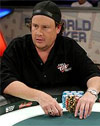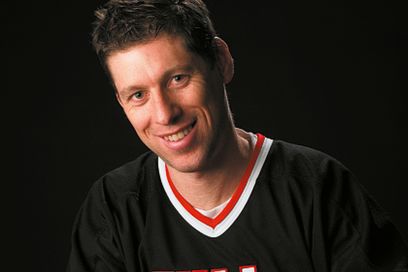
By Gavin Smith
 You have often heard me last year during the Word Poker Tour. My 2005-2006 schedule, I made 3 final tables. I won the Mirage event, finished 3rd at the Bellagio and 4th in tunic. If you saw me play on TV, you you are surely scratched his head repeatedly asking you: "why does this player plays so bad cards? ''
You have often heard me last year during the Word Poker Tour. My 2005-2006 schedule, I made 3 final tables. I won the Mirage event, finished 3rd at the Bellagio and 4th in tunic. If you saw me play on TV, you you are surely scratched his head repeatedly asking you: "why does this player plays so bad cards? ''
It is indisputable that I play an unconventional style. But there is a method behind the apparent madness.
I play a style usually referred to as the "small-pot poker." With this approach, I try to win the more than possible jars by applying maximum pressure on my opponents. Pre-flop, I raise often, especially when I have the position. My reminders are small, about 2-2 times and a half the big blind, instead of the usual 3 or 4 times. I raise with a wide variety of hands, hands of first quality in the trash, such as 6 d - 4 d, and 5 c - 8 c hands.
Usually, I miss the flop when I update with garbage hands. In fact, two-thirds of the time, I won't even a pair. But I tell myself that if someone call my raise pre-flop, it's also going to miss the flop twice on 3. When we miss them both, I have a big advantage: as the aggressor pre-flop, I have control of the hand. Most of the time (90% of the time), I bet the flop of about two-thirds of the pot. A good percentage of the time, this will be enough to take the jar.
Let me give you an example. Imagine that you are on the big blind and have Ks - Qs. I raise in late position of 2 and one-quarter times the big bling. K - Q suited is a more than decent hand against someone like me who constantly raises. On the other hand, this is not a hand with which you want to play all your chips, so you decide to caller.
When you choose the call, you are in a situation where you absolutely need to hit the flop. If the flop gives only bad cards for you, you might be afraid that I made two pairs with something like 4-7. Or, if there is an ACE on the flop, you might be worried that I made a pair with a real hand. Most of the time, you need to abandon after my update to the flop.
If you hit the flop, say something like K-Q-4, so much the better. With my style of play, I'm used to be very often check-raisé. But it is correct also. I always try to do too much risk when I update, so in this case, I will not hesitate to lie down.
There are some other advantages to play this style. As does power do not place me a hand in particular. Therefore, when I receive AA or KK, my hand will be well camouflaged. My opponent will be ready to me caller with a marginal hand, e.g. KQ to thus get in trouble. In this case, it may be able to flop top pair when I get myself an overpaire, which will certainly allow me to win a good part of his stack.
The other advantage is when I hold cards bins and I hit the flop really securely. If I raise with 5-7 and that I flop a straight, an opponent with dd will be in a quandary.
Some of the best tournament players - Daniel Negreanu, Gus Hansen and Phil Hellmuth to name these names using this approach of small pots. Is a good method for you? It is a question to which you must reply by you even.
I still warn beginners that this style of play will require you to make several difficult decisions (that is what you do with top pair, bad kicker on flop where the highest card is an 8 for example?). These are questions to which the more experienced players will have easier to respond with a better intuition for the game.
You can experiment with this style on your turn. Sign up for a tournament low buy-in and mix your style. If your tournament is not going as you want, you will be out of a tournament low buy-in.
 You have often heard me last year during the Word Poker Tour. My 2005-2006 schedule, I made 3 final tables. I won the Mirage event, finished 3rd at the Bellagio and 4th in tunic. If you saw me play on TV, you you are surely scratched his head repeatedly asking you: "why does this player plays so bad cards? ''
You have often heard me last year during the Word Poker Tour. My 2005-2006 schedule, I made 3 final tables. I won the Mirage event, finished 3rd at the Bellagio and 4th in tunic. If you saw me play on TV, you you are surely scratched his head repeatedly asking you: "why does this player plays so bad cards? ''It is indisputable that I play an unconventional style. But there is a method behind the apparent madness.
I play a style usually referred to as the "small-pot poker." With this approach, I try to win the more than possible jars by applying maximum pressure on my opponents. Pre-flop, I raise often, especially when I have the position. My reminders are small, about 2-2 times and a half the big blind, instead of the usual 3 or 4 times. I raise with a wide variety of hands, hands of first quality in the trash, such as 6 d - 4 d, and 5 c - 8 c hands.
Usually, I miss the flop when I update with garbage hands. In fact, two-thirds of the time, I won't even a pair. But I tell myself that if someone call my raise pre-flop, it's also going to miss the flop twice on 3. When we miss them both, I have a big advantage: as the aggressor pre-flop, I have control of the hand. Most of the time (90% of the time), I bet the flop of about two-thirds of the pot. A good percentage of the time, this will be enough to take the jar.
Let me give you an example. Imagine that you are on the big blind and have Ks - Qs. I raise in late position of 2 and one-quarter times the big bling. K - Q suited is a more than decent hand against someone like me who constantly raises. On the other hand, this is not a hand with which you want to play all your chips, so you decide to caller.
When you choose the call, you are in a situation where you absolutely need to hit the flop. If the flop gives only bad cards for you, you might be afraid that I made two pairs with something like 4-7. Or, if there is an ACE on the flop, you might be worried that I made a pair with a real hand. Most of the time, you need to abandon after my update to the flop.
If you hit the flop, say something like K-Q-4, so much the better. With my style of play, I'm used to be very often check-raisé. But it is correct also. I always try to do too much risk when I update, so in this case, I will not hesitate to lie down.
There are some other advantages to play this style. As does power do not place me a hand in particular. Therefore, when I receive AA or KK, my hand will be well camouflaged. My opponent will be ready to me caller with a marginal hand, e.g. KQ to thus get in trouble. In this case, it may be able to flop top pair when I get myself an overpaire, which will certainly allow me to win a good part of his stack.
The other advantage is when I hold cards bins and I hit the flop really securely. If I raise with 5-7 and that I flop a straight, an opponent with dd will be in a quandary.
Some of the best tournament players - Daniel Negreanu, Gus Hansen and Phil Hellmuth to name these names using this approach of small pots. Is a good method for you? It is a question to which you must reply by you even.
I still warn beginners that this style of play will require you to make several difficult decisions (that is what you do with top pair, bad kicker on flop where the highest card is an 8 for example?). These are questions to which the more experienced players will have easier to respond with a better intuition for the game.
You can experiment with this style on your turn. Sign up for a tournament low buy-in and mix your style. If your tournament is not going as you want, you will be out of a tournament low buy-in.




